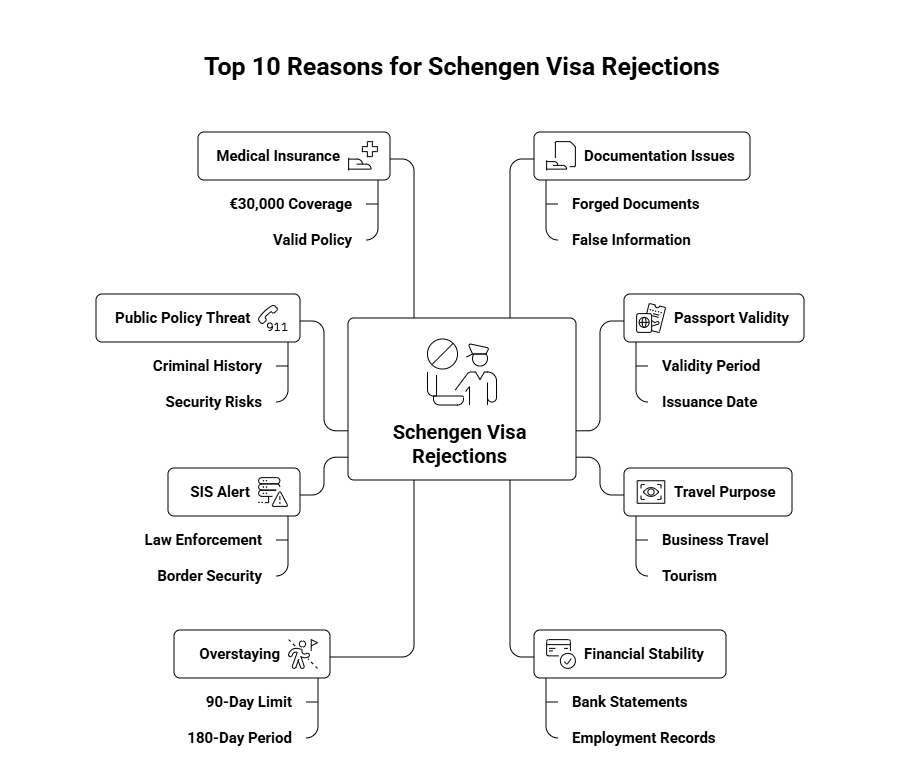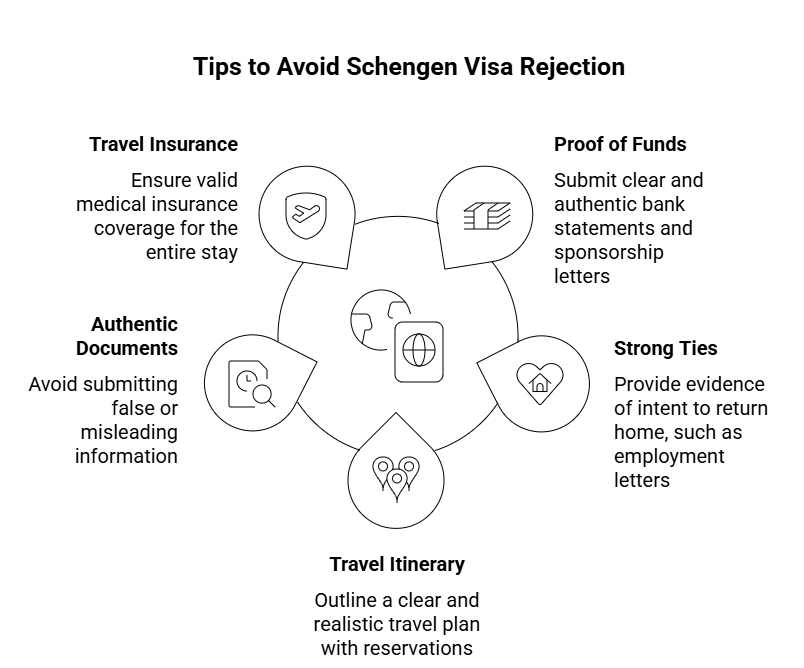Posted on October 27 2025
Top 10 Reasons for Schengen Visa Rejection and tips to avoid them
By , Editor
Updated October 28 2025
Some of the most common reasons for Schengen visa rejection include incorrect documentation, false information, insufficient financial funds, lack of valid medical insurance, unclear purpose of visit, and a criminal history. According to the latest SchengenVisaInfo statistics, nearly 1.7 million EU visa applications resulted in a Schengen visa rejection rate of 14.56%. To have a successful Schengen visa application, you must ensure that you submit the correct documentation, obtain valid medical insurance, have sufficient funds, and create a CV with a clear intention of visiting the country, among other factors.
Schengen visa applications are generally rejected in accordance with Article 32 of the EU Visa Code (Regulation 810/2009), which outlines the grounds for visa rejection. With a Schengen visa, you can gain travel access to 29 countries without having to apply for separate visas. Before applying for a Schengen visa, it is recommended that you first decide which country you want to apply to, schedule a Schengen visa appointment at least 6 months before your travel date, and submit the application at least 3-4 weeks before your intended travel date.
*Want to apply for a Schengen visa? Let Y-Axis help you with the process.
Top 10 reasons for Schengen visa rejections
The top 10 reasons for Schengen visa rejections are as follows:
- Forged or false documentation: Submitting fake or false documents is one of the major reasons for visa rejections. Forged documents like bank statements, fake employment letters, passports, etc., can lead to a visa rejection as per Article 32(1)(a)(i), which indicates a visa rejection on the grounds of fake or forged documents. Documents found to be forged or fake can result in a 5-year ban, as well as other criminal penalties.
- Invalid passport: Your passport must be valid for at least 3 months beyond your intended stay in the Schengen country and have been issued within the last 10 years.
- Unclear purpose of travel: Providing an unclear intent of travel, such as “business” or “tourism,” without any specific details, can lead to your visa being rejected. Applicants must submit clear evidence of attending conferences or meetings for business purposes, as well as hotel bookings or travel itineraries for tourism purposes.
- Lack of funds: Not having the required amount of funds for your trip can result in your visa being rejected. Immigration officers assess your tax records, bank statements, employment records, and the authenticity of your funds before approving your Schengen visa.
- Overstaying your intended period: Schengen short-stay visas are generally issued for a maximum of 90 days within 180 days. Applicants who overstay and exceed the allotted duration can risk an automatic visa rejection.
- SIS alert: The SIS alert is an entry-level verification process conducted by European countries for law enforcement and border security purposes. If your name is listed in the SIS, no visa can be issued to you. The alert could mostly be a result of previous immigration issues, such as overstaying or other legal issues.
- Being a threat to public policy (health, criminal policy, or security risks): Applicants with a criminal history, those posing a security risk, or those with communicable diseases may have their Schengen visa application turned down.
- Lack of valid medical insurance: Schengen visa applications must include a valid medical insurance policy worth €30,000; failure to do so can result in visa rejection.
- Incorrect or false information: Applicants who submit inaccurate or false information in their applications, such as unverified invitations or travel itineraries, may have their visa application rejected.
- Lack of intent to return: This is one of the most common reasons for a visa rejection. Immigration officers often refuse applications that do not demonstrate strong ties to the applicant's home country, lack evidence of employment, or fail to provide sufficient documentation, raising doubts about whether the applicant will leave the Schengen Area before the visa expires.

Also, read…
What are the new rules for Schengen Visa?
Tips to avoid Schengen visa rejection
To avoid a Schengen visa rejection, you must submit genuine and verified documents, along with clear and well-reasoned explanations for your travel.
Here are some tips you can follow to avoid getting your Schengen visa rejected:
- Submit clear and authentic proof of funds: Ensure you submit clear evidence of your finances, such as stamped and verified bank statements, a sponsorship letter, and your sponsor’s proof of funds (if you are getting sponsored)
- Strong ties to your home country: Submit strong evidence stating your intent to return to your home country. (An employment letter for your job back in your home country, documents for a property or ownership rights, or proof of enrolment if you are a student)
- Submit a clear travel itinerary: Outline a detailed and realistic travel itinerary plan, including travel destinations, dates, and other planned activities, as well as flight reservations and hotel bookings.
- Submit authentic documents: Avoid submitting incorrect or fraudulent documents with false or misleading information.
- Have valid travel insurance: Ensure you have a valid medical insurance policy worth €30,000 that covers your entire stay in the Schengen area.

Also, read…
How to get a 5-year multiple-entry Schengen visa?
Which countries can I visit with a Schengen visa?
You can visit around 29 countries in the Schengen area with a single Schengen visa. You also get visa-free or visa-on-arrival access to non-Schengen countries for short-term visits. Some of the 8 easiest countries to get a Schengen visa include Luxembourg, Slovakia, Lithuania, Latvia, and Finland.
Here is the list of 29 countries you can travel to with a Schengen visa:
- Austria
- Belgium
- Croatia
- Czech Republic
- Denmark
- Estonia
- Finland
- France
- Germany
- Greece
- Hungary
- Iceland (Non-EU)
- Italy
- Latvia
- Liechtenstein (Non-EU)
- Lithuania
- Luxembourg
- Malta
- Netherlands
- Norway (Non-EU)
- Poland
- Portugal
- Slovakia
- Slovenia
- Spain
- Sweden
- Switzerland (Non-EU)
- Bulgaria
- Romania
*Are you looking for step-by-step assistance with overseas immigration? Contact Y-Axis, the world’s No. 1 overseas immigration consultancy, for end-to-end assistance!
Tags:
Schengen visa rejection
Schengen visas
Schengen visa rejections
Schengen visa refusals
Schengen visa application
EU refusal reasons
apply for a Schengen visa
avoid Schengen visa rejections
Schengen countries with easy visa
overseas immigration
Share
Options for you by Y-Axis
Get it on your mobile
Get News alerts
Contact Y-Axis

